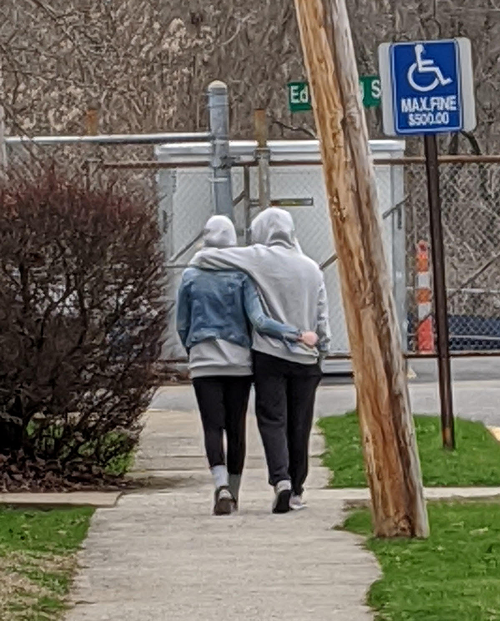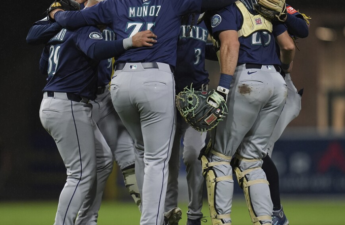
I took a walk two days ago, just around the neighborhood and down to the river. I’ve been trying to walk most days, keeping my distance, keeping our distance, six feet apart, the distance between people at their demise. I was walking behind this couple and I took their picture, I couldn’t help it. They were just kids, as people newly forty like to say of anyone their junior, but they really were – are – teenagers. It was only two days ago, after all. And they were so absorbed in each other, so wrapped up, literally, figuratively, that their contrast with the space we’re all to give each other at this time was all too clear. They can’t be living together yet, too young, they can’t be sheltering in the same place, the parents wouldn’t approve. Do their families, sheltering, shielding, shying away families know that when their kids are “going for a walk” they’re gathering to serve as potential vectors for disease? Of course they must, they have teenagers, they were teenagers once, they have read their Garcia Marquez. And this is not what you may think though I am 40 and they are 16, this is not admonishment. It is not generational war. I find them hopeful. I find them tragically encouraging.
We like to call things a war when there’s an enemy, but there isn’t an enemy, at least not one with the kind of volition we attribute to war. The enemy is alive, yes, it’s a virus, it’s trying to go viral as they do. It may evolve, it may grow, it may connect and breed and find a way to survive. A virus adapts best by stopping the war, declaring peace, agreeing to spread and survive for only mild discomfort, like the original coronavirus, the common cold. Killing the host is a failure for any strand of virus, for it dies too. Unlike some humans, it takes no glee, no sense of satisfaction, in causing the death of another. The goal is not to kill, but to live. It takes some discernment, some sorting out. They say this one comes from bats and bats feel no discomfort from COVID-19 at all, enabling it to brew and breed in perfect harmony with its environment.
I don’t need to strain too hard to draw the analogies you’ve all been considering in the last week or two in your respective sequester, your varying level of quarantine or, in some cases, essential work duties outside the home. Humans have been considered the virus on the planet’s surface for a long time and there is a poetry in a virus dispatched to dispatch a virus. I’m not rooting against us, of course, I’m too emotionally invested in our species and its individuals to be so cruel. And in the silly, often vain hope that every tragedy is an opportunity to learn, to change, to shift the way we do business or, perhaps, never do business again. The analogy I’ve coined, unfortunately, is a “Jump-Ball with Hitler.” There’s no basketball anymore, the only March Madness is off the court, but you haven’t forgotten the game so quickly. Every crisis, every disaster, it shifts the paradigms of what people think is possible and how quickly people and their world can change. And at each such juncture, the playing field is reset, the minds are wiped, there is opportunity to imagine the world anew. But nevertheless, even at these times of great opportunity, there is great peril. It could be social cohesion (at a safe distance), reimagining the world in a more humane image. But on the other side of that half-court line is fascism, muscly angry fascism, waiting to tip the ball of chaos into the hands of their team.
We are all on the same team in the present, however, even if we might want very different futures. We are on the human team against the virus and its ilk, we are rooting for our loved ones, all of them, to survive and thrive. When a person starts to get sick, there is fear, terror, heartbreak, one imagines their sudden death before they’ve done more than cough. Please God no anything but coronavirus. But for those who recover from any illness these days, be it a cold, be it a flu, be it mild fatigue, one begins to hope it was coronavirus. Because if they had it and they’re better, they’re immune. We think. We hope. We really aren’t sure.
I am grateful to be sure of so many things at this point in my life, feel deep debilitating wells of sadness for so many kindreds while appreciating my place of privilege. I am no longer an Uber driver, a job that functionally ceased to exist, in New Orleans, a city that is doing its level best to collapse (again). I am in remote Appalachia, ensconced with my wife, and we both have our jobs, paid in full, the work ongoing. Hers was already a duty done from home, her routine as undisrupted as any, though the ongoing isolation of our lives only accelerates. My shift has been a mere mile, the two-mile roundtrip I try to replace each afternoon giving wide berths to the couples and dog-walkers around me, now turning to help faculty whose dedication to studying the impacts and outcomes of this disease on our society is taking center stage. Classes, such as they will be, restart next week, on discussion boards or Zoom calls. Our families are safe for now, but wary, as we all are. Our loved ones too. The coughs and fevers and shakes break out here and there, we wish well, we watch, we wait for what we hope is no bad news.
For millions, there is no such luck. Relatives are falling ill and dying, family members sequestered where they cannot even be comforted in what will hopefully not be their final hours. Jobs are disappearing everywhere, gigs and employment and reliance on the steady check and health insurance vanishing like Democratic candidates before Super Tuesday. Remember the election, years ago, earlier in 2020? Remember when we almost invaded Iran? Now we’re content to hang back and kill them cruelly, quietly, from afar, our sanctions choking medical equipment out of needful hands as their hospitals overflow with the dead and dying. Back stateside, we’ve built a whole nation on the notion that one is no one without a job, that gainful employment is the only way to personhood, the only access point for those allegedly inalienable rights. We are endowed by our corporations, at least until they have to pause for a week or two, at which point they are content to deprive us of life, liberty, and the pursuit of happiness without due process of law. Congress scrambled and assembled, divided and came back together, to box up $2,000,000,000,000 – more than all the student debt owed in the country – and ship it out to the corporations, primarily, but also some people and hospitals and schools. The corporations will pocket their money, along with the infinite indefinite interest-free loans and fire the people anyway, sleeping easier in the knowledge they’ll have access to greater unemployment. 3,283,000 people filed last week already, but they are the tip of the spear-shaped iceberg lunging for the heart of American capitalism.
Meanwhile, the check’s in the mail, sort of, $1,200 for those who are poor enough to get it but rich enough to count. If you don’t have income, if you live on the street, if you work in the underground economy, then there’s no relief for you. Our moral judgments about human fates are still keenly fixed to a job implying worth, to rights deriving from the consent of an employer. Only those deemed worthy by the world of bosses and paychecks, with tax withholding and direct deposit only if you please, are eligible for consideration. And a token, $500, for the children of such people, those who’ve played the game sufficiently well that we can deem their losing in this moment, because of this crisis, not entirely their fault.
The checks won’t be out till late April, maybe May. The rent is due next week.
My father likes to think of crises as opportunities at values clarification. They are the chance to hold one’s feet to the fire, to decide what we really believe is important. The world is burning, what do we save? Congress, the federal government, unsurprisingly, they’ve gone largely with the shareholders. With equity, with P&E, with the pyramid scheme in the sickest city in the world. We saved the system from itself just twelve years ago, they tell us, and this time it’s not even the system’s fault! It is, of course, read your Shock Doctrine, but less obviously or egregiously so than then. We’ve spent generations building up our medical knowledge and technological understanding to prepare for just this sort of calamity; why should our way of structuring society be expected to follow suit? The lessons of the Depression have all been lost, saving and storing and stockpiling discarded for just-in-time, for get-rich-quick. There are people finding a way to profit from this, as there always will be, and that’s before the inevitable gouging on the cure, the patents that attempt, as usual, to put a price on life.
It goes on, despite all the direness around us. We are not physically barricaded inside, do not live in fear of our windows breaking or our door being breached as in so many movies that otherwise prepared us for this calamity. We are bounded by the distance we feel, the space between us, the gap between what we crave and what we have. A gap we can try to bridge if we find it worth the risk, it’s all a matter of risk and our ethos has been to reward risk at all costs. Two days ago on a cloudy afternoon, the risk of one teenager to meld oneself with another, to put everyone at risk for a feeling of connection. Or yesterday, for my wife and I, the risk to pick up sandwiches at a shop still open, to picnic on the grass by a river as people plunged their dogs into the water. Zoom out, roll back the clock, it could be just another unseasonably warm spring afternoon.
We are fortunate to live in Appalachia, a land where elevation change and social distancing were norms before they started trending. These risks and decisions, these minor distractions, would look very different in cities of my past, in Oakland, Boston, Washington DC. Day by day, moment by moment, we must choose to build the society we want to live in, to choose to be the species worth saving.
The prison, as it so often is, is largely of our own making. The lock is held fast not with a key, but with our mind.


